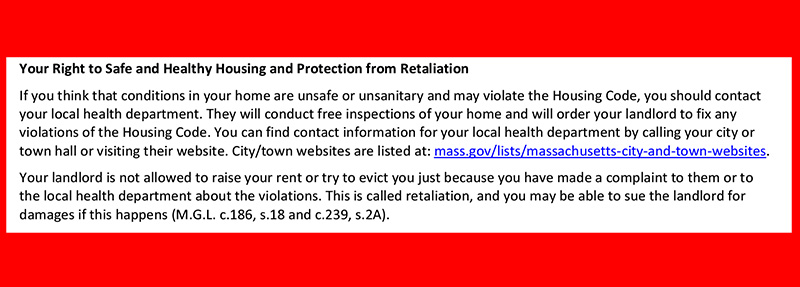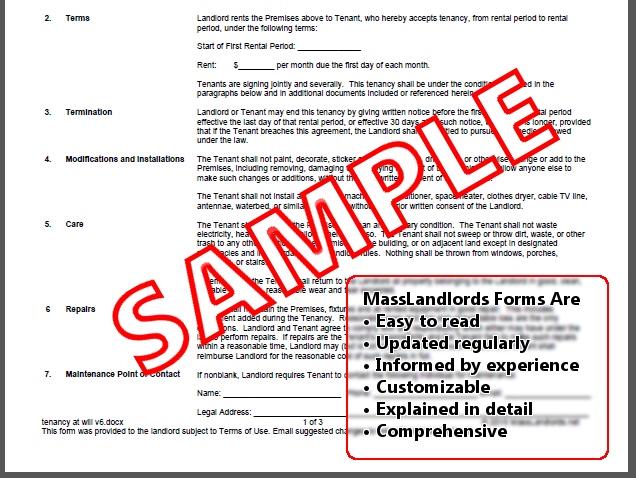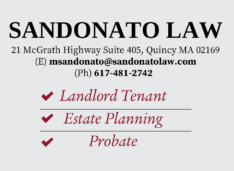New Tenancies After May 12 Must Include Notice to Renters About Safe Housing Rights
| . Posted in News - 12 Comments
By Kimberly Rau, MassLandlords, Inc.
As of May 12, 2023, landlords must provide renters starting a new tenancy with the state-issued Notice of Occupants’ Legal Rights and Responsibilities. However, we have reached out to the Department of Public Health (DPH), as we have serious concerns with the verbiage of the document.

This section of the new Notice of Occupants’ Legal Rights and Responsibilities is just one area of concern. Encourage your tenants to speak to you first about problems, so you can fix them as soon as possible. [Image: Public Domain]
Our issues lie with how the notice is worded in certain places. For instance, one portion of the notice reads, “If you think that conditions in your home are unsafe or unsanitary and may violate the Housing Code, you should contact your local health department.”
This is problematic on several levels. First, the word “should” implies that renters have a legal obligation to contact their local health department before talking to their landlord. But it’s in both parties’ best interests for tenants to discuss any concerns with their housing provider before talking to the board of health.
First, discussing the problem with the landlord gives them the opportunity to address the issue right off the bat. This keeps the lines of communication open and allows for good will between renter and landlord. And tenants can always contact the health department if the landlord fails to fix the problem.
But perhaps more importantly, the law allows renters to withhold rent if their housing is sub-standard. Whether the tenants retain possession depends on whether they owe the landlord more than the landlord owes them, once the landlord has been given notice. Yes, you will receive notice once the board of health has completed its inspection, but that could be weeks later. Those weeks do not work in the tenant’s favor, because the landlord was not on notice, and it makes it harder for them to maintain possession. It also may end up costing the landlord more money, since certain problems may get worse before they receive notification.
The way the law is structured encourages renters to let their landlords know about problems at least as soon as they contact the health department. The notice works against this by implying tenants do not need to bring their concerns to you, the housing provider.
Listed Resources Violate Landlords’ First Amendment Rights
Our second issue with the notice is on page 2, where tenants are directed to a list of resources, including masslfr.org, masslegalhelp.org and madeuptocode.org. While these sites may be useful, they are not government sites. In fact, they are owned by organizations that advocate for policies that are contrary to landlord interests.
Why is this an issue? It’s a problem because these are not objective resources. A recent court memorandum and order from a 2020 case Baptiste v. Kennealy, speaks out against use of such resources.
“[T]he court finds that plaintiffs are likely to prevail on their claim that the second paragraph of 400 C.M.R. §5.03(2) unconstitutionally compels speech by requiring plaintiffs to include in any notice of rent arrearage addresses of non-governmental websites that, in turn, refer tenants to tenant advocacy groups, including City Life/Vida Urbana, with interests adverse to plaintiffs’.”
This is exactly what the new notice does. By insisting we give tenants a notice that directs them to those sites, the state is compelling us to make our tenants the customers of our political opponents. The only way such an order would be lawful is if the websites were operated entirely by non-political organizations, which they aren’t.
As structured, this violates landlords’ first amendment rights. Compelled referrals of this kind, along with the verbiage that suggests landlords are endorsing those sites, makes this compelled speech.
We have voiced our concerns to the DPH, urging them to suspend the requirement of issuing the notice until the verbiage of the notice can undergo a notice and comment period just as the regulation itself did. We asked the DPH to issue a retraction within seven days, which they failed to do. We asked that they start notice and comment within 120 days. Concerns such as ours should be properly heard and addressed by DPH, but it may be necessary for us to obtain a court order.
In the meantime, we recommend you comply with the law and provide your new tenants a copy of the notice, or post it, as required. But when you present them with it, let them know that you are always willing to hear about their concerns as soon as they arise, and will be happy to address them as soon as possible.
We will keep you updated on any changes with this regulation as they may occur.
Revisions
- v1
- Initial version
To view this form, you must be logged-in and a member in good standing

MassLandlords is a nonprofit dedicated to helping owners rent their property. We try our best, but we can't guarantee these forms will always work. We provide legal information but never advice particular to your situation. Nothing on this site is meant to create an attorney-client relationship. We advise you consult with an attorney.
This rights sheet suggests renters shouldn't talk to you first about housing issues and forces you to recommend resources that are not landlord-friendly. We will fight this if we have to!




